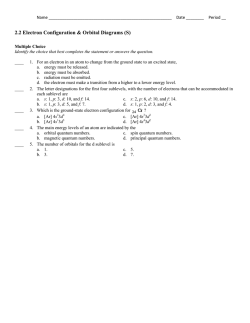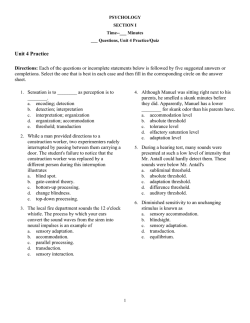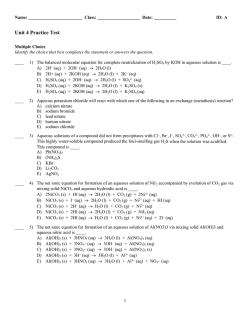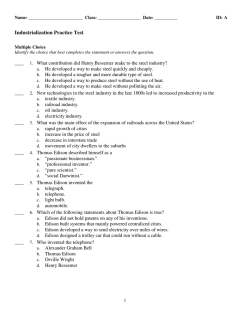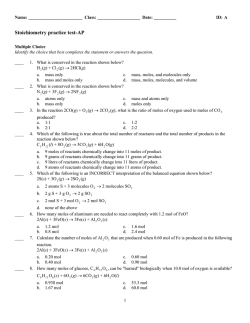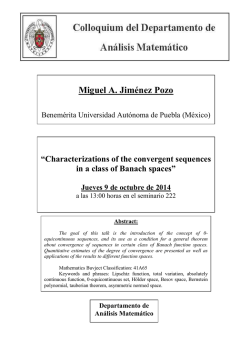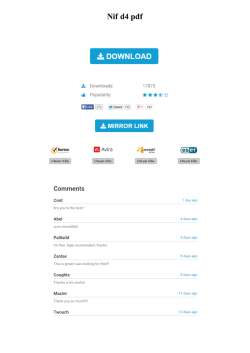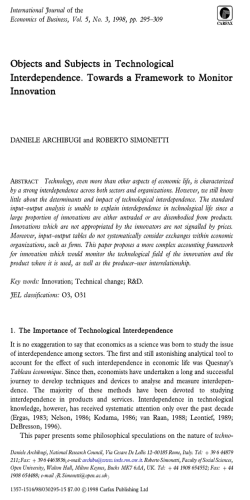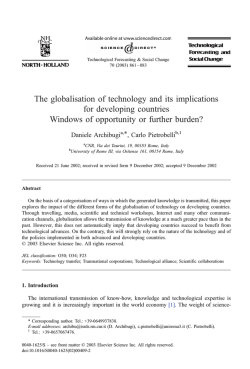
Ejemplo de cómo rellenar las Tablas del proyecto de acreditación
Título: Ingeniero Industrial ESCUELA TÉCNICA SUPERIOR DE INGENIEROS INDUSTRIALES SUBJECT: THE DESIGN PROCESS. TOOLS AND METHODOLOGIES CODE: 0094 DEPARTMENT: ENGINEERING PROJECTS FIELDS OF KNOWLEDGE: ENGINEERING PROJECTS DESCRIPTORS * * Theory of the project Process of the Project: statement, information, standards, safety, fiability and decision making . Year: 4 Intensification: OBLIG Credits: 4 GENERAL OBJECTIVES At the end of the course, the students will: HAVE ASSIMILATED THE NECESSARY THEORETICAL KNOWLEDGE ABOUT THE DESIGN PROCESS. By means of this knowledge, both general and specific, students will acquire a global scope of all activities involved in the design process. This scope, useful for every type of product, is necessary to tackle complex problems like a product design. HAVE ACQUIRED SKILLS AND ATTITUDES TO DEVELOP A CONCEPTUAL DESIGN OF AN INDUSTRIAL PRODUCT. The students will have learned and practised a methodology, with its corresponding tools, for products conceptual designing. That methodology will enable students to apply the different technological knowledge acquired through their studies in the career to a multidisciplinary and ill-defined engineering problem, and it is a good guide for their future product designs. The methodology also is used as a paradigm of how to solve complex problems like the one proposed in the subject, extracting general conclusions and applying them to different type of projects. SPECIFIC OBJECTIVES. CAPABILITIES AND ABILITIES. KNOWLEDGE Obj.1 Obj.2 Obj.3 Obj.4 Basic knowledge about the theory and methodologies of the project. Theoretical knowledge to state, solve, evaluate y realise an industrial product Project. Environmental factors: legislation, standards, market, competitors’ products, users… Tools needed to develop project activities ABILITIES Obj.5 To fulfill the Project activities by jeans of the available tools. Obj.6 Obj.7 Obj.8 Obj.9 Obj.10 Capacity to gain knowledge and skills from deduction derived from Project Theory, in order to improve the development of project activities. Capacity to gain knowledge and skills from the practice and experience gathered inductively throughout the subject, in order to improve the development of project activities. Capacity of applying scientific and technological knowledge gathered along the subject. They will be applied in a systematic and rigorous way to problems encountered along the Industrial Product Design project carried out. Capability of decision-making in an objective way, even in situations where the problem is poorly defined or data is subjective. Capacity of decision-making in an objective way, when the problem is clearly defined, reliable data is available and the designer must choose between two or more alternatives. Obj.11 Teamwork capability, capacity for carrying out all the previously stated activities in a communal manner. Título: Ingeniero Industrial ESCUELA TÉCNICA SUPERIOR DE INGENIEROS INDUSTRIALES ATTITUDES Obj.12 Creativity, initiative, rigor, enthusiasm, competence and leadership. Obj.13 Obj. 14 Measurement of risks, error magnitude, decision importance, etc. Constant questioning of the implications derived from activities or decisions taken. Continuous reflection of the cause and effect observed along projectual activity. Search for relations between activities and results. Curiosity and will for improvement in knowledge of project science discipline. BASIC CONTENTS OF THE SUBJECT Objective associated 2 Nº Name of the unit 1 Introduction to the subject. 2 Approach to the Project. Technological problem vs. Projectual problem. 3 The Theory of the six dimensions 4 Project´s metodologies. 5 Sources of information. 7,8 3,8 6 User´s demands. Quality Function Deployment.. 4,5 7 Working in groups. 8 Creativity. 2,12 9 Síntesis of technological systems. 8,12 10 Factorial análisis. 3,8 11 Multicriteria decision. Selection of alternatives. 2,8,9 12 Economic análisis. 2,8,9 13 Risk análisis. 2,8 1,6,7 7,8,12 8,13,14 LABORATORIES Dedicación del alumno 3 h. Obj. específico asociado 11, 12 P2. User´s demands. QFD 4h 7, 8, 12 P3. Functional analysis 3 h. 7, 8, 12 P4. Computer assisted creativity. TRIZ techoptimizer.. 3 h. 5, 12 Título y breve descripción. P1. Working in groups BASIC REFERENCES (1) (2) (3) (4) (5) (6) Pugh S., Total design Addison Wesley, Workingham. 1991 Ullmann D.G., The Mechanical Design Process, Mc. Graw Hill, 1997 Roozenburg, N.F.M, Eekels, J. Product Design: Fundamentals and Methods. John Wiley & sons. Chichester. 199 Pahl, G., Beitz, W. Engineering Design. A systematic approach. Springer-Verlag. London. 1996 Terninko J., Step-by-step QFD. Customer driven product design. St. Lucie Press, FLO, 1997 Gómez-Senent, E.; Santamarina, J.L.; Chiner, M., Aragonés, P., Capuz, S. “The Design Dimensions. A Design Theory Proposal”. Internacional Conference on Engineering Design (ICED’97), Tampere, 1997. (7) Teoría y Proceso del Proyecto. Apuntes de la asignatura STAFF RESPONSABLE Daniel Collado Ruiz
© Copyright 2026
